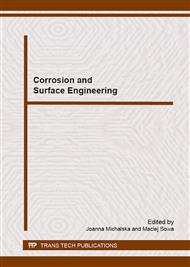p.286
p.290
p.294
p.298
p.302
p.309
p.313
p.317
p.321
Biofilm Formation on NiTi Surface by Different Strains of Sulphate Reducing Bacteria (Desulfovibrio desulfuricans)
Abstract:
Bacteria of Desulfovibrio genus belong to group of widespread sulphate-reducing bacteria (SRB). D. desulfuricans is considered one among many bacterial species involved in microbiologically influenced corrosion (MIC) of metals, mainly of stainless steels and other alloys. SRB can produce gaseous hydrogen sulphide. This gas is released into the environment leading to formation of metal sulphides that significantly influence electrochemical processes and ultimately enhance the corrosion of materials. Biofilms formed by these bacteria are especially harmful for highly alloyed steels and many alloys. The aim of this work was to compare the character of growth and biofilm formation by three strains of D. desulfuricans (standard soil strain DSM and two wild intestinal strains: DV/A and DV/B) on the surface of NiTi alloy.
Info:
Periodical:
Pages:
302-305
DOI:
Citation:
Online since:
January 2015
Price:
Сopyright:
© 2015 Trans Tech Publications Ltd. All Rights Reserved
Share:
Citation:


